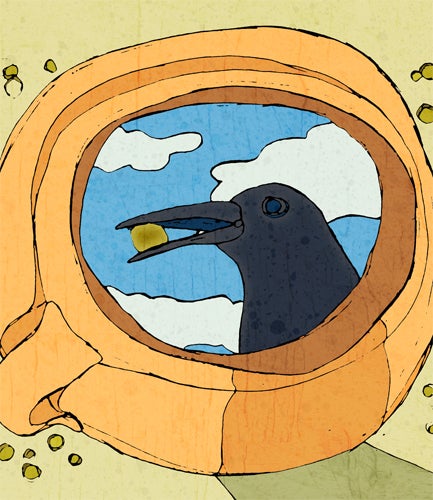Aesop's fable? This one turns out to be true
Scientists re-enact tale of crow that managed to drink from half-full pitcher of water

Your support helps us to tell the story
From reproductive rights to climate change to Big Tech, The Independent is on the ground when the story is developing. Whether it's investigating the financials of Elon Musk's pro-Trump PAC or producing our latest documentary, 'The A Word', which shines a light on the American women fighting for reproductive rights, we know how important it is to parse out the facts from the messaging.
At such a critical moment in US history, we need reporters on the ground. Your donation allows us to keep sending journalists to speak to both sides of the story.
The Independent is trusted by Americans across the entire political spectrum. And unlike many other quality news outlets, we choose not to lock Americans out of our reporting and analysis with paywalls. We believe quality journalism should be available to everyone, paid for by those who can afford it.
Your support makes all the difference.One of Aesop's fables describing a thirsty crow which was able to drink from a half-full pitcher after raising the water level by adding pebbles may have had a basis in real life.
Scientists have found that rooks – a member of the crow family – were able to figure out how to raise the water level in a laboratory container by dropping stones inside to retrieve a tasty worm floating on the surface.
Four different rooks, called Cook, Fry, Connelly and Monroe, quickly discovered that they could raise the water level in a transparent container by adding stones, just like the mythical crow in the fable, which illustrates the virtue of ingenuity and how necessity is the mother of invention.
The only other animal shown to be able to perform the same task is the orang-utan, which was able to grasp a floating peanut by spitting water into a tube. Scientists believe the demonstration shows that, in many respects, rooks and crows have comparable intelligence to primates when it comes to the use of tools.
"We have performed a large number of studies on both corvids [members of the crow family] and apes, and have found that the crow's performance is on a par or often superior to apes. However, it is not particularly useful to say that one species is more or less intelligent than another because often the playing fields aren't even," said Nathan Emery of Queen Mary, University of London, who carried out the work with Christopher Bird at Cambridge.
"This [study] suggests that they can not only think through complex problems requiring the use of tools, but imagine the consequences of their actions without trial-and-error learning, and create novel solutions to these problems that have never been encountered before," Dr Emery said.
"This has only ever been shown in the great apes and humans and is more surprising because the birds have brains the size of walnuts and these birds do not use tools in the wild."
The latest research, published in the journal Current Biology, follows earlier studies of the same group of hand-reared rooks showing that they were able to fashion a simple tool out of wire to help them retrieve food from an empty container. Other scientists have discovered that wild crows living in the French territory of New Caledonia can make similar tools to retrieve grubs from tree holes.
"We believe that intelligence in rooks and other crows evolved primarily to solve social problems, as almost all crow species live in large social groups, but they also mainly form pair bonds, like human marriages, and some of their cognitive abilities appear to have evolved to help them predict what others are going to do next – so-called mind reading," Dr Emery said.
"This may have developed into understanding about the psychological properties of unseen forces that are important in using and making tools."
Join our commenting forum
Join thought-provoking conversations, follow other Independent readers and see their replies
Comments